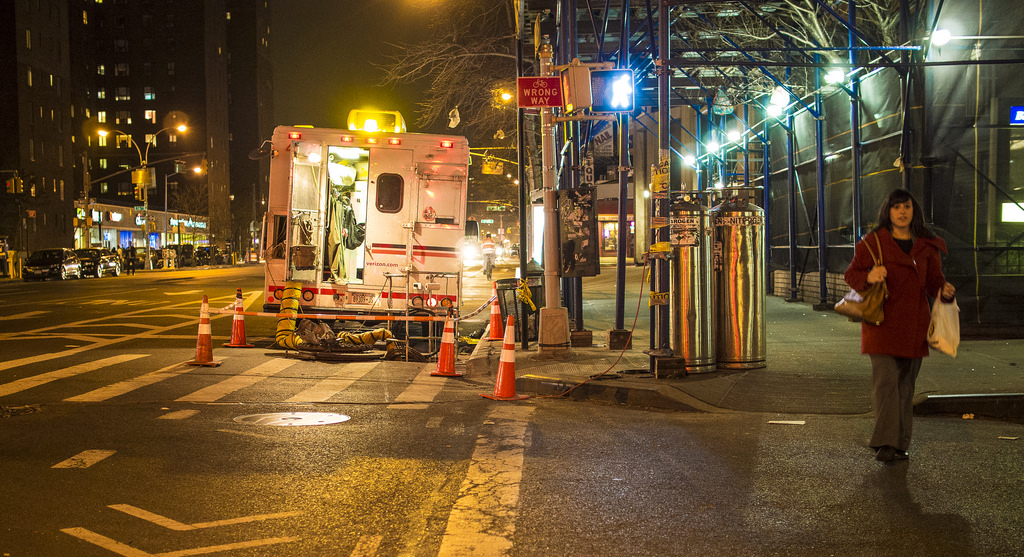Verizon was supposed to roll out its Fiber internet to households in New York City, offering super-fast internet connection to over 3.1 million households. However, it seems the carrier is unable to meet this requirement, which prompted the city to actually file a lawsuit against the company. According to the statement by Mayor Bill de Blasio, the city intends to make Verizon suffer for lying to millions of New Yorkers.
"Verizon must face the consequences for breaking the trust of 8.5 million New Yorkers,” the statement reads. “Verizon promised that every household in the city would have access to its fiber-optic FiOS service by 2014. It's 2017 and we're done waiting. No corporation - no matter how large or powerful - can break a promise to New Yorkers and get away with it."
It seems Mayor de Blasio is definitely serious about what he and his constituents are threatening to do, but Verizon itself is denying that the city has any basis for the lawsuit. According to the company’s statement to Ars Technica, there is no need for them to install their FiOS connection to every single building in the city. Verizon is even touting the 2.2 million homes that it has already serviced in NYC.
Just to give readers some context regarding the whole kerfuffle, it all started with the 2008 agreement that Verizon signed in order to be given citywide access for providing cable connection. One of the provisions involves making sure that every single household will have easy access to the company’s Fiber line, which was supposed to have been achieved back in 2014.
This is what the city is essentially complaining about in its lawsuit. In response, a spokesperson from Verizon told Ars that Mayor de Blasio might not understand the agreement between the company and city well enough.
"Mayor [Bill] de Blasio should read our agreement with the city,” the spokesperson said. “Then he could clearly conclude—as others have before him—that we have lived up to our obligation 100 percent. We'd appreciate his support in getting access to buildings where landlords resist allowing us to build fiber to people’s homes."



 Federal Judge Rules Trump Administration Unlawfully Halted EV Charger Funding
Federal Judge Rules Trump Administration Unlawfully Halted EV Charger Funding  U.S. Condemns South Africa’s Expulsion of Israeli Diplomat Amid Rising Diplomatic Tensions
U.S. Condemns South Africa’s Expulsion of Israeli Diplomat Amid Rising Diplomatic Tensions  Panama Supreme Court Voids CK Hutchison Port Concessions, Raising Geopolitical and Trade Concerns
Panama Supreme Court Voids CK Hutchison Port Concessions, Raising Geopolitical and Trade Concerns  Palantir Stock Jumps After Strong Q4 Earnings Beat and Upbeat 2026 Revenue Forecast
Palantir Stock Jumps After Strong Q4 Earnings Beat and Upbeat 2026 Revenue Forecast  U.S. Lawmakers to Review Unredacted Jeffrey Epstein DOJ Files Starting Monday
U.S. Lawmakers to Review Unredacted Jeffrey Epstein DOJ Files Starting Monday  Meta Faces Lawsuit Over Alleged Approval of AI Chatbots Allowing Sexual Interactions With Minors
Meta Faces Lawsuit Over Alleged Approval of AI Chatbots Allowing Sexual Interactions With Minors  CK Hutchison Launches Arbitration After Panama Court Revokes Canal Port Licences
CK Hutchison Launches Arbitration After Panama Court Revokes Canal Port Licences  Jensen Huang Urges Taiwan Suppliers to Boost AI Chip Production Amid Surging Demand
Jensen Huang Urges Taiwan Suppliers to Boost AI Chip Production Amid Surging Demand  Court Allows Expert Testimony Linking Johnson & Johnson Talc Products to Ovarian Cancer
Court Allows Expert Testimony Linking Johnson & Johnson Talc Products to Ovarian Cancer  Newly Released DOJ Epstein Files Expose High-Profile Connections Across Politics and Business
Newly Released DOJ Epstein Files Expose High-Profile Connections Across Politics and Business  California Sues Trump Administration Over Federal Authority on Sable Offshore Pipelines
California Sues Trump Administration Over Federal Authority on Sable Offshore Pipelines  Tencent Shares Slide After WeChat Restricts YuanBao AI Promotional Links
Tencent Shares Slide After WeChat Restricts YuanBao AI Promotional Links  SoftBank Shares Slide After Arm Earnings Miss Fuels Tech Stock Sell-Off
SoftBank Shares Slide After Arm Earnings Miss Fuels Tech Stock Sell-Off  Minnesota Judge Rejects Bid to Halt Trump Immigration Enforcement in Minneapolis
Minnesota Judge Rejects Bid to Halt Trump Immigration Enforcement in Minneapolis  Nvidia, ByteDance, and the U.S.-China AI Chip Standoff Over H200 Exports
Nvidia, ByteDance, and the U.S.-China AI Chip Standoff Over H200 Exports 


























